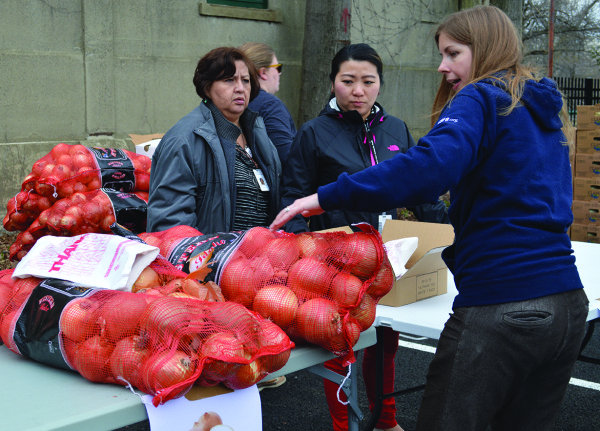By Melanie Toner | Assistant Manager of Corporate Relations
As a specialist in preventive medicine and GBFB’s first Director of Public Health and Research, Kathryn Brodowski, MD, MPH, is passionately committed to “connecting the dots” to solve health problems. After seeing many patients diagnosed with chronic diseases such as diabetes, heart disease, high blood pressure, lung disease, depression, and obesity, she chose to focus on the bigger picture.
“What struck me was not only the volume of patients facing chronic health issues, but the number who returned to the hospital for exacerbations of their illness. I realized ‘Band-Aids’ aren’t enough.” She explained. “I wanted to get at the root causes of my patients’ poor health, and that’s when the world of food insecurity opened up to me. I saw that access to nutritious foods played an important role in preventing or helping to treat their disease.”
A 3-Pronged Approach
At GBFB, Dr. Brodowski is working with our new Food Security Task Force to bridge the connection between hunger and health, while also forging partnerships with community health centers to address food insecurity through a 3-pronged approach.
First, she is leveraging GBFB’s powerful logistical and distribution capacities to provide community health centers and their low-income patient populations with onsite Mobile Market fresh produce distributions. Participating patients choose from a variety of fresh fruits and vegetables, and receive healthy recipes and nutrition information. To maximize impact, these Mobile Markets are being piloted in communities with high levels of food insecurity as identified by GBFB’s hunger mapping technology.
Secondly, she is encouraging community health centers to implement Hunger Vital Sign™ screening, originally developed by Children’s HealthWatch, a simple 2-question method to identify patients struggling with food insecurity.
Finally, she wants to empower providers with practical steps they can take when a patient screens as food insecure. She is developing a ‘tool kit’ to connect food insecure patients with the food sources and community resources that are vital to their health. Instead of existing in silos, medical and community organizations can collaborate and contribute to patients’ overall health.
Healthier Lives, Healthier Communities
It is an opportune time for GBFB to be furthering our work to bridge hunger and healthcare. The Affordable Care Act’s (ACA) emphasis on quality of care and lowering treatment costs for chronic health conditions is putting pressure on the medical field to collaborate with organizations like GBFB to address the underlying issues causing or contributing to disease.
Our belief is that healthcare and hunger-relief organizations are natural allies. By working together we can further each other’s mission – to End Hunger Here and improve health. We’re particularly focused on vulnerable populations, like seniors and children.
“Research tells us that kids who don’t have access to nutritious foods have poor overall health and are at higher risk for behavioral and psycho-social problems,” concludes Dr. Brodowski. “Hunger and its associated stress have life-long, negative impacts. Parents can face unthinkable decisions when they can’t afford medical treatment and healthy food for their child. An ounce of prevention with consistent access to healthy foods may go a long way towards stabilizing chronic health conditions and preventing costly trips to the emergency room.”
Prior to joining GBFB, Dr. Brodowski served as chief preventive medicine resident at University of Massachusetts Medical School (UMMS), where she drafted food insecurity policy recommendations, worked as a nutrition instructor for low-income families, and tested her ideas through a “Food Insecurity Clerkship.”
“A recent survey found that 85% of physicians point to unmet social needs, such as lack of access to nutritious food, as directly leading to worse health. Addressing those needs is vital,” notes Dr. Brodowski. “But doctors and nurses need training and support to help identify food insecure patients and to connect them with needed resources. GBFB’s community health center Mobile Markets represent expanding and deepening clinical-community linkages.”
Project reports on GlobalGiving are posted directly to globalgiving.org by Project Leaders as they are completed, generally every 3-4 months. To protect the integrity of these documents, GlobalGiving does not alter them; therefore you may find some language or formatting issues.
If you donate to this project or have donated to this project, you can receive an email when this project posts a report. You can also subscribe for reports without donating.
